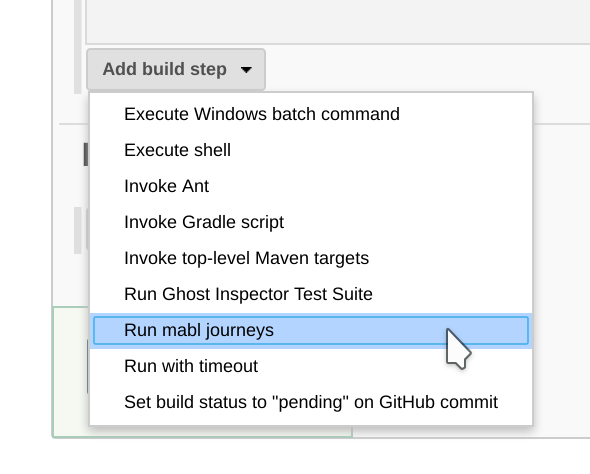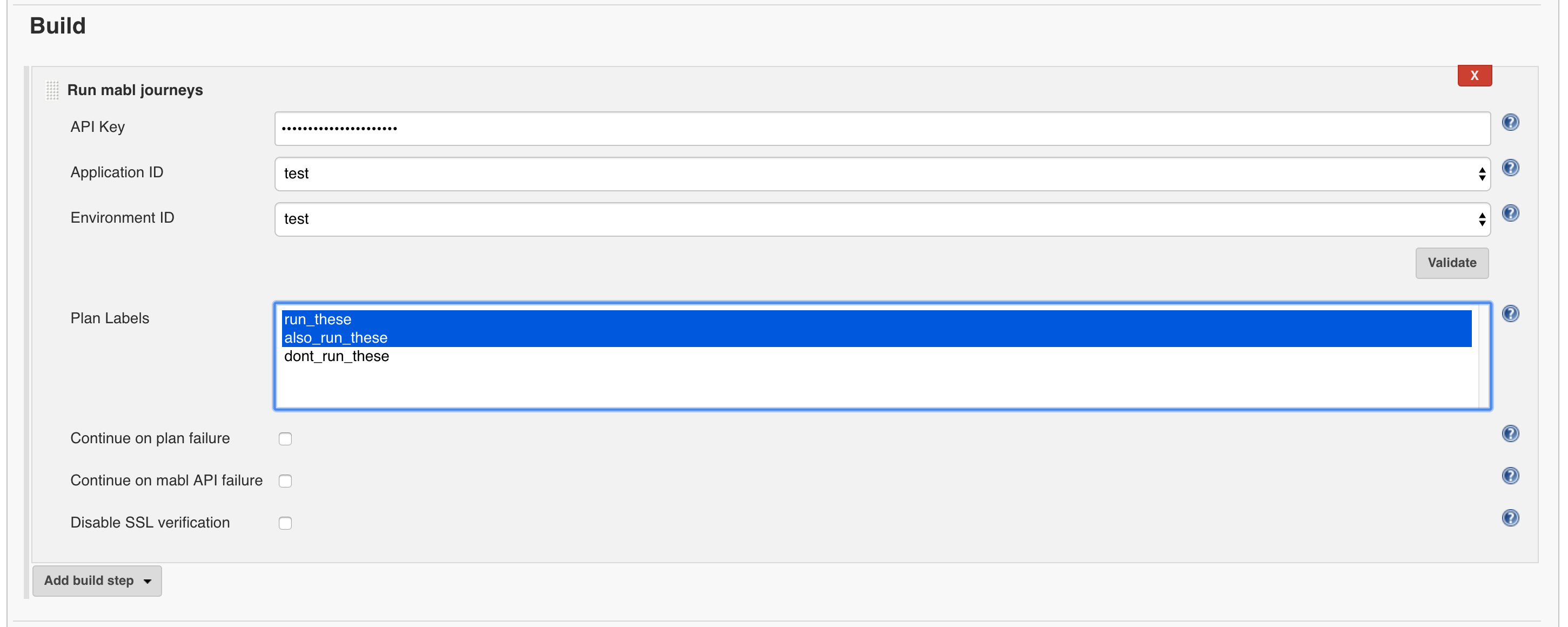View mabl Integration on the plugin site for more information. |
|---|
This plugin allows you to integrate mabl test journeys with your CI/CD workflow.
Features
- Launch mabl journeys as a project step
- Fail your Jenkins build if the mabl journeys fail
- Optionally continue on failure
Requirements
- Minimum Jenkins version 1.580.1
- mabl API key
- See integration docs for details
- See integration docs for details
Adding a mabl Project Step
Add a Run mabl journeys step to your new or existing project.
Configure the API key. Then select environment, and application from the drop-down. At least one of environment and application must be supplied. All matching plans and their journeys will be run during this step. The step will block until the tests are complete/failed, or one hour has elapsed.
You make continue on failure using the advanced configurations.
- Filter by plan labels to run only plans tagged with the selected labels. (You can select multiple labels using shift/ctrl click.)
- Continue if your plan/journeys fail
- Continue if there is an unexpected error in the mabl API
Adding a mabl Pipeline Step
In a pipeline step, select 'Configure'. In the pipeline script, insert a pipeline step for mabl. This can be written by hand or created via the 'Pipeline Syntax' tool. Here is an example output:
- mabl: The pipeline function to be called. - Required
- applicationId: Selects the application to run deployments against (one of environmentId or applicationId is required)
- continueOnMablError: Continue if there is an unexpected error in the mabl API
- continueOnPlanFailure: Continue if your plan/journeys fail
- environmentId: Selects the environment to run deployments against (one of environmentId or applicationId is required)
- restApiKey: The apiKey of the desired deployment workspace - Required
mabl applicationId: 'APP-ID-a', continueOnMablError: true, continueOnPlanFailure: true, environmentId: 'ENV-ID-e', restApiKey: 'REST-API-KEY'
OR something like this:
node {
stage('mabl') {
node {
step([$class: 'MablStepBuilder', restApiKey: 'REST-API-KEY', environmentId: 'ENV-ID-e', applicationId: 'APP-ID-a'])
}
}
}
Environment Variable Collection
The mabl plugin will optionally collect build and repository information to send along with mabl deployments. This will give more information and insights into testing environment state for journey runs. We will not collect sensitive information like passwords or API keys.
To enable this feature:
- Go to the 'Manage Jenkins' page from the 'Dashboard'
- Go to the 'Configure System' page
- Find the 'mabl' section and check the 'Send build environment variables to mabl' checkbox
Now you'll see the environment and build information collected in the output log of future runs that use a mabl plugin step.
Send build environment variables is set. Collecting the following information: 'GIT_BRANCH' => 'origin/master' 'GIT_COMMIT' => 'a246e0c756791965bdb6fc9caa1a36775422fcec' 'GIT_URL' => 'git@github.com:example/my_repository.git' 'GIT_PREVIOUS_COMMIT' => 'a246e0c73a691935bdb6fc9caa1a36775422fce5' 'JOB_NAME' => 'mabl integration' 'BUILD_NUMBER' => '47' 'RUN_DISPLAY_URL' => 'http://127.0.0.1:9090/job/mabl%20integration/47/display/redirect'
Change Log
v0.0.16 (04 October 2019)
- Fix bug when displaying status for multi-stage plans.
v0.0.15 (05 September 2019)
- The output of failed run with link is now available
v0.0.13 (30 July 2019)
- Support for plan label filtering in the mabl build step
v0.0.10 (08 June 2018)
- The mabl plugin is now available to use a pipeline step
- Optionally allow mabl to collect environment information to enhance deployment journey insights
v0.0.9 (08 June 2018)
- The output of mabl tests are now available as junit XML in the workspace directory for reports and download
v0.0.8 (18 May 2018)
- Environment and Application drop downs automatically populated from API key
v0.0.7 (17 May 2018)
- More resilient to failures
v0.0.6 (18 April 2018)
- Advanced form validation support added
v0.0.5 (13 April 2018)
- Support for Windows console output and encodings
v0.0.4 (12 April 2018)
- Initial release




